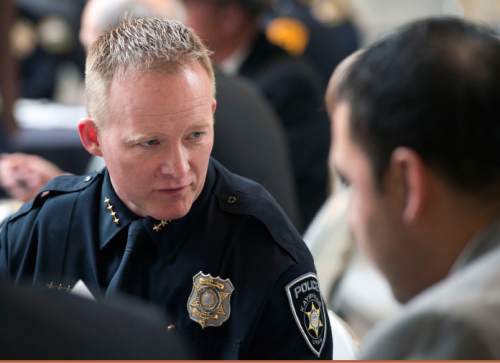This is an archived article that was published on sltrib.com in 2016, and information in the article may be outdated. It is provided only for personal research purposes and may not be reprinted.
The Kaysville police chief visited the White House on Wednesday to participate in a conversation on community policing.
As part of the President's Task Force on 21st Century Policing, the White House is reaching out to members of local law enforcement agencies, said Chief Sol Oberg, who hopes implementing the recommendations discussed in the meeting will help Utah's local officers "do a better job of serving communities."
"In the weeks since the tragedies in Dallas, Baton Rouge [La.] and St. Paul [Minn.], all Americans have been reminded why a criminal justice system that lives up to our values is so integral to ensuring our women and men in blue can protect our communities safely," a White House news release says.
Throughout the summer, representatives of more than 300 local law enforcement agencies have gathered for the discussions and workshops, according to the release, and Oberg is the only officer from Utah who has participated.
A big part of the message the White House is trying to get out, Oberg said, is that "issues often blamed on police are societal issues."
Societal issues — like mental illness, which police officers aren't "trained to fix or funded to fix" — slip through the cracks and eventually "play out on the street, where police respond," Oberg said.
"Because of a lack of funding across the board, police are left holding the bag to fix these societal issues," Oberg said. "A lot of [societal issues] are left at the police level because there aren't other resources, other places to turn."
As the face of the government, police officers are blamed for societal problems that haven't been solved yet, Oberg said, and police officers don't always deal with those issues the way someone else thinks they should.
If the goal is to fix the issues, the whole community needs to become more involved, he added.
"There's just a gambit of societal issues not being resolved before they're something police get involved with," Oberg said. "It can be a little bit late at that point."
One tactic, he said, is to try to handle issues earlier in life before they become something police have to take care of.
The White House training and discussion covered many topics, Oberg said.
"I took a ton of notes, and I think in general Utah law enforcement does very well, better than other parts of the country, but there are always things we could do better," he said. "They talked about using transparency [in the agency] to build trust and use it as a tool to gain citizen engagement."
The discussion also included a portion on how officer safety and wellness — or the lack thereof — affects how police leaders make decisions and choose "appropriate reactions," he said.
The group of officers discussed "implicit biases" across the nation, Oberg said, and "how those biases can play out through prejudice behavior."
There also was a social media training, Oberg said.
"I got a lot out of it and hope to bring it back with me," he said.
Twitter: @mnoble



